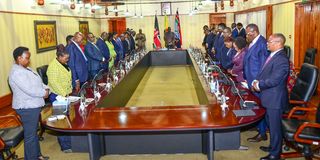Premium
Cabinet abandons plan to privatise six State-owned sugar firms

President William Ruto chairs a Cabinet Meeting at Sagana State Lodge on August 8,2023.
The Cabinet has approved a plan to abandon the planned privatisation of the State-owned sugar companies and instead adopt a lease and operate framework, a move aimed at not only reviving the performance of the millers but also keeping their ownership within the state.
The companies are Nzoia Sugar Company, Chemelil Sugar Company and South Nyanza Sugar Company.
The others are Miwani Sugar Company, Muhoroni Sugar Company and Mumias Sugar Company which are in receivership.
The Cabinet also approved the extension of the framework for duty-free importation of milled sugar to bridge the supply deficit which is seeing prices of the sweetener retail at a historic high.
Last week, President William Ruto promised lower sugar prices in two weeks stating that the government had issued licenses for traders to import sugar from outside the Common Market for Eastern and Southern Africa (Comesa) after stocks of the product run out in the region.
“Today’s decision sets the sugar sub-sector on a path of renewal by vacating the earlier decision by Cabinet to privatize State-owned entities within the sub-sector. If the proposal by Cabinet receives Parliamentary approval, the State-owned entities would be operated under a lease and operate framework,” said the Cabinet.
At the same time, the government will from next month start registering new elderly citizens, orphans, persons living with disability and vulnerable households into the Inua Jamii safety net programme as part of the major reforms that were approved by the Cabinet yesterday.
A dispatch from the Cabinet said registration of new members into the cash-transfer programme will open on September 1 in a major boost to eligible individuals and households who are currently locked out of the programme.
The last registration was carried out between July and August 2017, which means that thousands or possibly millions of eligible individuals have been locked out of the programme due to funding hitches that have delayed a fresh registration drive.
Currently, the Inua Jamii program benefits 1,233,129 Kenyans, including 353,000 orphans and vulnerable children, 833,129 elderly citizens, and 47,000 persons with severe disabilities.
The beneficiaries are given a stipend of Sh2,000 monthly which is usually disbursed in tranches and is a critical source of much-needed cash for these vulnerable groups at a time the cost of living is rising sharply.
“Cabinet sanctioned a fresh wave of registration of persons under the Inua Jamii Safety Net Programme of senior citizens, persons living with disability, and vulnerable households,” said the Cabinet.
The Cabinet has also split the loss-making National Oil Corporation (Nock) into three entities with different mandates as part of drastic reforms aimed at making the State-owned entity profitable.
To turn around the fortunes of the parastatal, the Cabinet yesterday approved the division of the parastatal into NOC Upstream Limited, NOC Downstream Limited and NOC Trading Limited.
In the new turnaround plan, NOC Upstream Limited will be focused on exploration and upstream production activities and services at a time Kenya is aiming to join the league of oil producing countries.
NOC Downstream Limited will be focused on marketing and distribution of petroleum products and will be expected to pose stronger competition to the dozens of players in the oil marketing business in the country.
Meanwhile, NOC Trading Limited will specialise in holding strategic stocks of petroleum products for import and export.
The Cabinet also announced a Sh420 billion equity investment into key special economic zones (SEZs) by the African Export-Import Bank (Afrexim Bank). The 100 percent equity investment in in the SEZs at Dongo Kundu, Naivasha and Isiolo as well as export processing zones in Sagana, Del Monte, Eldoret and Busia and regional centres.
“The economic hubs are additionally expected to incubate export quality assurance and packaging as well as the roll out of electric boda bodas with the ancillary infrastructure to support eMobility,” it said.
Thousands of youth will also be major beneficiaries after the Cabinet approved the scaling up of the Kenya Youth Empowerment and Opportunity Project (KYEOP) to the National Youth Opportunities Towards Advancement (NYOTA) Programme.
The upscaled programme will targets youth aged between 18 to 35 in all our nation’s 47 counties.
Farmers are also major winners after the approval of duty free importation of raw materials for processing of animal feeds which is a significant boost at a time drought and high cost of inputs has reduced milk production leading to high prices.
“The State intervention seeks to address the cost of production of animal feeds as part of the long-term strategy to enhance the competitiveness of Kenya’s dairy sector within the region,” said the Cabinet.
The Cabinet also approved the National Labour Migration Policy which seeks to eliminate inefficiencies that have prevented thousands of qualified Kenyans from seeking well-paying jobs abroad.
The Cabinet noted that the policy is crucial as it will enable more Kenyans to net jobs abroad at a time the country has become reliant on diaspora remittances as the largest source of foreign currency.
“This groundbreaking policy is expected to enhance Kenya’s international presence and influence by better coordinating labour migration through the official classification and regulation of all forms of labour,” it said.
At the same time, the Cabinet approved the establishment of an ultra-modern Bomas International Convention Centre (BICC) that will feature will feature a conference centre, a presidential pavilion and at least five hotels.
The move aims to entrench Kenya’s position as a regional hub for conference tourism, hospitality, and event and aviation industries.
It also approved the tabling of the Public Relations and Communications Management Bill, 2023 and the Statute Law (Miscellaneous Amendments) Bill, 2023 to Parliament.





